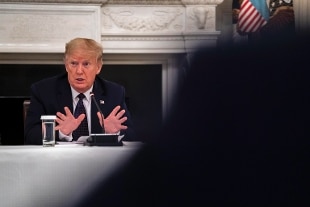Share
May 22, 2020 At the time when, for the first time in ten years, the United States is ready to open a three-way negotiation with China and Russia for the limitation of nuclear weapons, Donald Trump has announced the exit from another multilateral agreement: the Open Skies treaty, "Open skies", one of the most important bilateral arms control agreements signed with Moscow. "I have good relations with the Russians - said the president of the United States - but they have not respected the treaty".The president will officially communicate the decision to Vladimir Putin today. Washington is expected to exit the agreement in six months. Germany has asked Trump to reconsider his decision.
After liquidating the Paris agreements on climate change, and threatening to exit the World Health Organization, Trump moved on to military arrangements.
The Open Skies treaty dates back to '92, born in the sign of transparency of the post-Soviet period. The aim was to avoid international crises on the basis of misunderstandings or suspicions, "militarily" opening up the skies to mutual control, through devices equipped with sophisticated sensors and, of course, unarmed.
The United States has long denounced continuous violations by the Russians, which would no longer allow the overflight of American aircraft.
The Kremlin replies: such a decision represents - said the Russian Deputy Foreign Minister, Alexander Grushko - "not only a blow to European security but also to the existing military security instruments and to the essential security interests of the US allies themselves".
If Moscow called Washington's decision a "coup to European security", the announcement alarmed Allied countries. NATO ambassadors have decided to convene an urgent meeting today. The risk of tensions in transatlantic relations seems, at least apparently, mitigated by the decision, which emerged a few hours after Trump's announcement, to start trilateral meetings for the first time with Russia and China itself for mutual control of nuclear weapons.
White House Special Envoy Marshall Billingslea will meet with Deputy Foreign Minister Sergei Ryabkov in Vienna to organize the summit. But the decision could also presuppose Washington's exit from the New Start treaty which obliges the US and Russia to deploy no more than 1550 nuclear missiles each. The deal will expire in February 2021, three months after the American presidential election.

